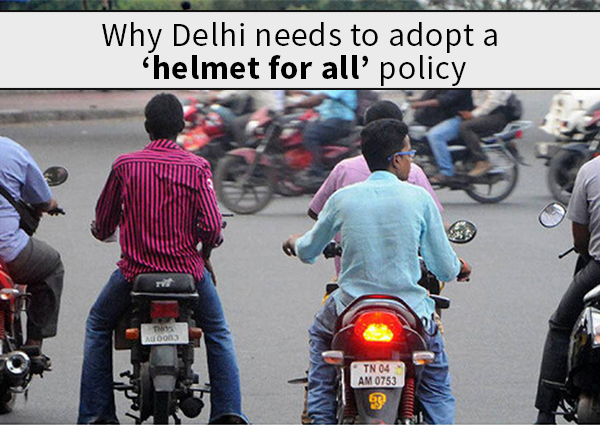Why Delhi needs to Adopt a ‘Helmet for All’ Policy
In the following article, we will be discussing the topic why Delhi needs to adopt a ‘helmet for all’ policy: “My head is not stronger than yours,” a lady who was interviewed said when the interviewer asked her what she thought of the fairer sex resisting helmet. “And it is not about looks because I cannot risk my life for my looks,” she continued. “Then why don’t we see women wearing helmets in Delhi?” the interviewer asked. “Responsible women wear it. Others do not go for it, because it is not mandatory under the law,” she said. “I think the companies should make it tempting such as tan-proof helmets or women-friendly helmets.”
Well, we think she has a point as taking the legal route to helmets has failed in Delhi the national capital. The very first time the Delhi government tried bringing legislation asking women drivers/riders to wear headgears was in the 1990s. The move met huge opposition from the Sikh community in particular and women in general. It was said that wearing any kind of headgear other than turban was against the basic tenets of Sikh religion. Around 100 Sikh women marched to the Delhi High Court shouting slogans against BJP which was in power in the city, on November 1997. They even filed a petition challenging the move to make helmet mandatory for all two-wheeler riders. Thus, the state government succumbed as Safety became a casualty.
Those who witnessed the agitation said the government did not want to lose the vote-share of ‘Punjabis’ and ‘Sikhs’. In June 1999, before the city went to assembly polls, the state government amended or altered the Delhi Motor Vehicles Rules 1993. “It shall be optional for women whether riding pillion or driving on a motorcycle to wear protective headgear,” says section 115 (2) of the Rules of Delhi Motor Vehicles. Though the protest was spearheaded or lead by the Sikh community, women of every religion got rid of the ergonomic headgear. As Bizarre as it may sound, but the only known argument was that since policemen would not be able to identify Sikh women from their appearance, there came an all women exemption.
The helmet is back, but with a twist. On Wednesday, the State Government told the Delhi Court that it would make mandatory for all women riders to wear a helmet. But then just the next day, the government again took a U-turn and said that it would maintain the status quo. Even though the government will be hesitant to admit, the reasons are no different from the factors in 1999. “They have to be sensitive to our religion. Though we have no issues with a Sikh woman wearing a helmet. But the government should make it optional for them,” said Manjeet Singh, member of the Delhi Gurudwara Prabhandak Committee.
It is this approach of ‘keep it optional’ and considering a helmet as an imposition rather than as a safety measure, which has caused more damage than good. The statistics suggest that there is absolutely no reason for Delhi not to implement a ‘helmet for all’ policy. Last year, around 705 people who were two-wheeler riders died in road accidents in Delhi. Of which, 47 were women. More than 35% of road accident casualties in Delhi in 2011 involved two-wheelers. That is about 3% more than 2010 figures. A report of the union ministry of highways and road transport shows that two-wheelers accounted for the highest share of total road accidents (23.8%) in India followed by tempos and trucks. In 2010, two-wheeler accidents caused 19.1% of casualties.
Developing countries including Cambodia, Vietnam and Uganda are involved in the Global Helmet Vaccine Initiative which works with private sectors, governments and NGOs to promote motorcycle helmets. But there is no such policy in India.“In our country, there is actually no political will to take such a bold decision,” as stated by the president of the Institute of Road Traffic Education, Dr Rohit Baluja. He also added that in his knowledge, Delhi is the only state which has rules that exempt women from wearing headgears.
Police officials say that women drivers are as vulnerable to road accidents as males and thus helmets are equally important for them as well. In fact, women pillion riders are more exposed to the risk of head injury because they have nothing to hold on to and so they risk falling in the middle of traffic so they helmets for women are much necessary. But even the Police cannot do much in the absence of law. “The only way we can bring in mindset is by creating awareness. We do that regular basis,” stated by Satyendra Garg, the Joint Commissioner of Delhi Traffic police.



